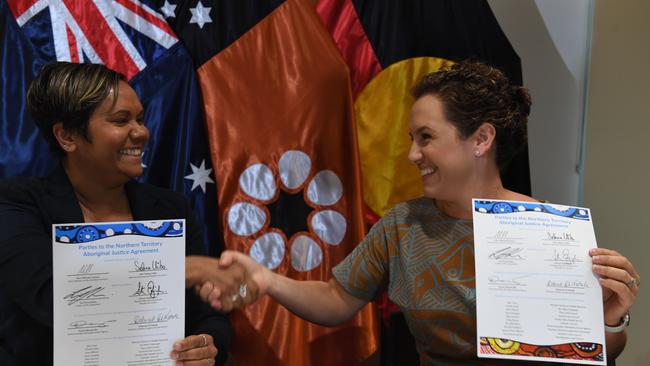Both sides on board for NT Indigenous deal on cutting crime
Both sides of politics in the NT have signed on to a landmark seven-year Aboriginal Justice Agreement that aims to cut incarceration rates.

Both sides of politics in the Northern Territory have signed on to a landmark seven-year agreement that aims to cut incarceration rates and tackle problems such as domestic violence by involving Indigenous people in redesigning the justice system.
The deal, the result of 160 consultations conducted with Aboriginal communities and organisations over three years, will lead to the introduction a suite of community-led initiatives such as local law and justice groups, community courts and alternatives to custody.
Many Territory towns and outback settlements experience shockingly high crime rates. The overwhelming majority of inmates in the NT’s overstuffed prisons are Aboriginal.
Labor and the Country Liberals traditionally compete for suburban swing voters by attacking each other over who can better reduce crime.
The result has been a seesaw of reforms that have left many Aboriginal leaders and communities angry, demonised and unsupported. Bipartisan endorsement of the Aboriginal Justice Agreement means that, for the first time, significant reforms may outlive election cycles.
Attorney-General and Justice Minister Selena Uibo acknowledged the “gross overrepresentation” of Aboriginal people in prisons and thanked the opposition for helping ensure the changes sought by Aboriginal communities would “survive … to deliver a fairer, better and more equal justice system”.
“We are supporting a new model of delivery that will reduce reoffending and imprisonment rates of Aboriginal Territorians, engage and support Aboriginal leadership, and improve justice responses and services,” she said.
“We have started by offering alternatives to custody so that the justice system offers options other than the high cost of imprisonment.
“The Alice Springs Life Skills Camp offers women skills and teaches resilience so we can address underlying causes of their offending with culturally appropriate rehabilitation.”
Opposition Leader Lia Finocchiaro said her Country Liberal Party “pushed very hard to be a signatory” to help give those involved the confidence to invest. She said endorsing the agreement did not equate to leniency.
“Reducing incarceration is about reducing the number of people who … break the law in the first place. It’s not about sending less criminals to jail,” she said.
“As much as strong laws and sentencing are important for the community and the CLP, so are things like alternative sentencing options … what we need to do is reform our entire system to give people opportunities and options in life so that a pathway of crime is not a way for them.”
The CLP opposes raising the age of criminal responsibility for juveniles and wants mandatory sentences for attacks on frontline workers and a presumption against bail for repeat adult and youth offenders.
Labor has signalled it would like to raise the age of criminal responsibility and overhaul mandatory sentencing but appears fearful of provoking a community backlash.
Aboriginal Justice Unit director Leanne Liddle said the consultation process that led to the agreement was one of the most comprehensive and robust ever in the NT.
Her team used cultural brokers and interpreters and visited 120 communities. Where locals needed more time to consider, the team went back more than once. “When we did the consultations, people said, ‘is this for politics or for us?’ And we hand-on-heart said, ‘this is for you’,” she said.
“People don’t like living with crime in their communities, people don’t want to live in the disadvantage and poverty that they currently live in, and people see this as a change agent that has no room for politics. I’m very pleased that both parties have signed this document.”




To join the conversation, please log in. Don't have an account? Register
Join the conversation, you are commenting as Logout